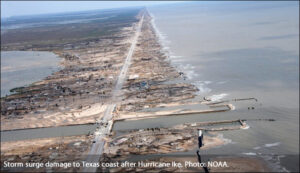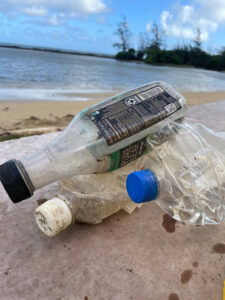Welcome to the second installment in our series. As mentioned in our first article, IBSS is a NOAA Weather-Ready Nation (WRN) Ambassador and we intend for these articles to help you identify, prepare for, and enjoy the sunny, warm, and sometimes stormy summer weather.
Nothing beats a good day at the beach in the summer. There’s just something about the sun, sand, waves, and ocean breeze that seems to rejuvenate the spirit. But before you pack up the cooler and folding chairs, be sure you check out these tips to make sure your beach day isn’t a total wipe-out.

Sea you at the beach
If you’re new to ocean swimming, you should know that it’s not like swimming in a pool. Swimming against waves and currents takes much more energy and can lead to exhaustion or muscle cramping. Jellyfish, sea lice, and the occasional snapper or turtle can also add to the challenges. Check the weather forecast (weather.gov), make sure you’re a competent swimmer, and bring the right gear for the swim – goggles, fins, swim cap, and beacon if you are heading out further than a few hundred yards from shore. If you can, find a buddy to go with you – the safer you are, the more fun you will have. And if you’re bringing small children with you, stay in shallow water, make sure they wear floaties, and stay within arms reach at all times.
It may be tempting to find a secluded beach off the beaten path with no one else around, but it’s always safer to swim near a lifeguard. Swimming at a beach with lifeguards will reduce your risk of drowning down to 1 in 18 million according to the U.S. Lifesaving Association. Lifeguards will also be aware of the current conditions and will warn people if the conditions become dangerous. Listen to them. That said, it’s important to take responsibility for yourself and anyone with you while at the beach.
Coastal areas like beaches can be deceiving. You might see a beautiful clear sunny day and think everything is perfect. But ocean currents, waves and rip tides might be affected by weather events happening hundreds of miles away from you. That’s why you can’t just rely on your local forecast, you also need to check out the surf zone forecast.
Safety Is No Accident
The beach is a great place to spend some of those long summer days. Just make sure you follow the advice laid out in this article so your biggest problems are sand and seagulls. Also check out our previous article, Tips on How to Beat Heat, UV, Air Quality This Summer, as everything discussed there applies to the beach as well. And remember, always swim near a lifeguard. Use the buddy system. If you’re not a strong swimmer, swim with someone who is. Make sure small children wear floaties. Now that you’re prepared, get out there and have fun!
Join us for part 2 of our beach article where we’ll look at rip currents!






